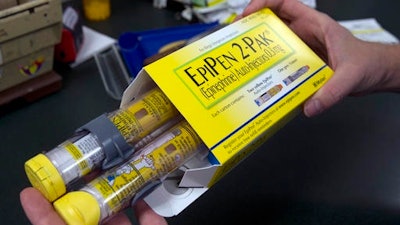
TRENTON, N.J. (AP) — The maker of EpiPen emergency allergy injectors, under a microscope for repeatedly jacking up the price of the life-saving device, revealed Wednesday that it's a target of two price-related probes by federal agencies and has had its premises searched.
The news, disclosed in a filing with the Securities and Exchange Commission, came after Mylan Inc. reported that it swung to a third-quarter loss, mainly due to a big settlement for overcharging the federal government for the product. Mylan's results missed Wall Street expectations, and the company stuck with the reduced 2016 profit forecast it issued last month when it announced that $465 million settlement.
In the SEC filing late Wednesday, Mylan disclosed that on Oct. 7, "Mylan received a document request from the Division of Enforcement at the SEC seeking communications" with the Centers for Medicare and Medicaid and documents concerning Mylan products sold to the Medicaid Drug Rebate Program."
Mylan, which is technically based in England but operates out of its Pittsburgh-area headquarters, also disclosed in the filing that on Sept. 8, the Department of Justice subpoenaed a company subsidiary, a senior executive and other employees about alleged price fixing and also executed multiple search warrants related to its probe. Mylan said that Justice is seeking "additional information relating to the marketing, pricing and sale of" four generic medicines — cidofovir, glipizide-metformin, propranolol and verapamil — "and any communications with competitors about such products."
Rumors have been floating since last week that the Justice Department is investigating multiple makers of generic medicines for price fixing and collusion. That follows a trend in recent years of some generic drugmakers raising prices in near lockstep for medicines that compete with one another, mainly for drugs that are only made by two or three generic companies.
Mylan wrote that it intends to cooperate with both the SEC and Justice inquiries.
Mylan also received a subpoena in December 2015 from the Justice Department Antitrust Division seeking information relating to the marketing and pricing of its generic doxycycline "and any communications with competitors about such products."
The SEC filing also noted that Mylan has been hit this year with about 20 potential class action lawsuits filed by either shareholders or companies that paid for Mylan's products alleging conspiracies to fix and raise prices for various generic medicines it sells.
Mylan said on Oct. 7 that it would pay $465 million to settle allegations that it overbilled Medicaid for years for EpiPen. The settlement with the Justice Department followed news that EpiPen has been incorrectly classified since late 1997 as a generic product under the Medicaid health program for the poor and disabled, rather than as a brand-name drug, for which rebates owed to Medicaid would be nearly twice as high as for generic medicines.
That charge, other litigation costs and higher spending on marketing, administration and research, partly related to acquisitions, doubled Mylan's operating expenses in the latest quarter.
Mylan has become the latest poster child for pharmaceutical industry price-gouging, for hiking the price of a pair of EpiPens from $94 in 2007, when it acquired the product, to $608 this year, despite making no substantive improvement to EpiPens over that stretch. Meanwhile, analysts and others have estimated that it costs less than $10 to produce one EpiPen.
CEO Heather Bresch, who recently testified before Congress that much of the $608 dollar list price for a pair of EpiPens goes to middlemen, told analysts on a conference call that the current payment system needs change.
"The system needs reinventing across the entire U.S. health care landscape," she said, along with greater transparency on how prices are set.
That's ironic, given that Mylan does not break out sales figures for its top seller and best-known product, EpiPen, contrary to standard industry practice, and didn't discuss the two probes on the call.
The company also said that it now plans to launch a $300 generic version of EpiPen in December, after initially saying on Aug. 29 that it would do so within several weeks.
Mylan posted a third-quarter loss of $119.8 million, or 23 cents per share, after reporting a $428.6 million profit a year earlier. Earnings, adjusted for non-recurring costs, came to $1.38 per share, well below the $1.50 per share analysts expected.
The company, which mostly makes generic drugs, posted revenue of $3.06 billion in the third quarter, also missing Street forecasts, which averaged $3.23 billion.
Mylan said its generics business brought in $2.61 billion, and its specialty drug division, which sells EpiPen and a couple other brand-name products, had sales of $418.7 million.
Mylan said it still expects full-year earnings in the range of $4.70 to $4.90 per share, down from a forecast issued in August of $4.85 to $5.15 per share. The company revised its outlook after announcing the $465 million settlement.
In after-hours trading, Mylan shares dropped 97 cents, or 2.5 percent, to $37.95, after rising $1.81, or 4.9 percent, to $38.92 in regular trading, when drugmakers and much of the broader markets were up.






















